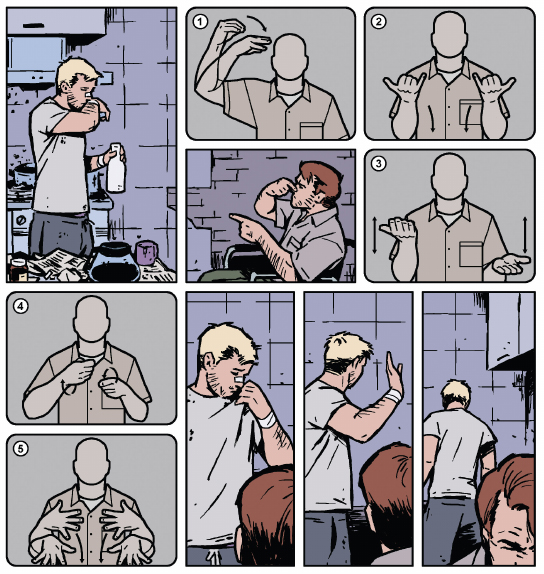In 1983 during Mark Gruenwald’s four-part mini-series Hawkeye, Hawkeye, Clint Barton, Hawkeye was rendered 80% deaf by an injury he sustained. According to Matt Fraction, the writer of the critically acclaimed Hawkeye (2012), “it was the first time I saw disability like that in a comic” and he remembers the shock of understanding that this injury was permanent.
I got the chance to sit down with Fraction at Heroes Con 2019 in Charlotte, North Carolina. As we talked, he recalled reading The Avengers #239, where the Avengers met David Letterman. During the issue, Clint begs producers to give him the questions ahead of time and worries that Letterman might improvise. Anyone with a disability knows this fear, including myself. The idea that inaccessibility can force you to miss out on major things. In the issue, Hawkeye, as Fraction describes it, “is so in his own head that he doesn’t enjoy himself.” That moment really stuck with Fraction because unlike a lot of the other Avengers, “Hawkeye is a regular guy who got to be an Avenger but is still dealing with regular guy problems.”
Hawkeye remained deaf within the continuity up until around 1998. After dying and coming back, Clink Barton’s hearing was restored. It wasn’t until Fraction and artist David Aja’s Hawkeye did the character lose his hearing again, this time through a retcon. In Fraction’s run, Clint wasn’t originally born deaf but was deafened as a child. Later in the series, the villain Clown stabbed Clint in his ears and once again ruptures his eardrums.
Fraction said it was important to bring back Hawkeye’s deafness, something fans have also been asking to happen in the MCU, because “he has friends in the hard of hearing and deaf community who had never really seen themselves or their language, ASL, represented in comics.” Fraction has a unique relationship to ASL, saying that he taught his children to sign before they could speak. According to Fraction, he sees a lot of parallels between ASL and comics, stating they are both “visual languages.”
Hawkeye #19 is written entirely in ASL and while Fraction knows the language, he also knows he is ” a tourist within the deaf community.” His goal in creating the comics was also to honor the language, being as true to it as possible. He said, “I hope to be a good guest within the [deaf and hard of hearing] community.”

One of the ways he did this was by consulting Leah Coleman and her mother Rachel Coleman, friends of Fraction. Fraction commented that Leah Coleman helped perfect some of the idioms within the way the symbols were signed. This is something very easily missed or not understood by those who are not deaf or hard of hearing. Additionally, Fraction mentioned, “Leah [Coleman] gave my son his sign name.”
But Fraction not being part of the deaf and hard of hearing community mirrors a lot of what Clint goes through himself. Hawkeye has always been a loner who doesn’t want to fit within a group and his reaction to being deaf is no different. As someone who is disabled and has hearing issues due to vestibular migraines, this is something that resonates with me. According to the CDC, 1 out of 4 adults in the United States has a disability, but obviously not all of them label or consider themselves disabled. Hawkeye’s reluctance to call himself disabled or acknowledge his hearing loss again is something a lot of people who are disabled go through.
During the interview, Fraction mentions that, “Clint’s deafness is his superpower since he is just a regular guy.” He went on to explain, it shows the character’s ability to adapt which is why he makes not only a compelling character but an Avenger. This is also similar to something I know I have said in the past. Disabled people function, adapt, and survive. Additionally, while Clint takes a while to come around to accepting his deafness as reality again, it is important to note the comic is never about healing him but instead, adapting.
Often comics will focus on magic cures or alien science to cure characters of real-life ailments and while that is understandable, it is not realistic to disabled people’s actual lives and discredits a lot of the amazing things about being disabled. Fraction mentions he acknowledges, “we probably did a million things wrong but I hope our intent was clear.”
At the time, Hawkeye was a juggernaut and a consistent top seller for Marvel. Fraction says he was grateful to Marvel for letting him tell this story and granting him creative freedom. Fraction also hopes that this run has opened up more opportunities to showcase disability within the medium and states that it is not only important for fans to see themselves within the medium but for able-bodied people to see them as well.

